Bad moods happen — whether it’s stress, exhaustion, or just one of those days. The good news? What you put on your plate can actually make a difference. Here are things to eat when you’re feeling like crap that boost energy, calm nerves, and bring a little comfort back when you need it most. In this article we explore 12 mood boosting foods, comfort foods for anxiety and brain foods for energy.
Inside this article:
We Are What We Eat
We’ve all heard the phrase “we are what we eat,” and science backs it up. According to the American Psychological Association, about 95% of serotonin — the “feel-good” hormone — is produced in the gut, showing just how closely food and mood are connected.
Harvard Health Publishing also notes that people who follow diets rich in fruits, vegetables, and whole foods have up to a 30–35% lower risk of depression compared to those who eat heavily processed diets. A balanced, healthy diet doesn’t just fuel your body; it also supports your brain, energy, and emotional resilience.
Mood Food: Mindful Choices
You’re not alone in wanting food that actually supports how you feel. With 36% of people worldwide now prioritizing emotional wellbeing as their top health goal, there’s a growing recognition that what we eat can genuinely impact our mental state. The ingredients we’ll explore — like vitamins B6, B12, C, and magnesium — aren’t just nutritional buzzwords. They’re behind a real shift in how we think about food and mood, with brain-health products featuring these nutrients seeing a 51% increase in recent years.
So when the rough days hit, these are the things to eat when you’re feeling like crap — comforting, nourishing foods that can help you reset.
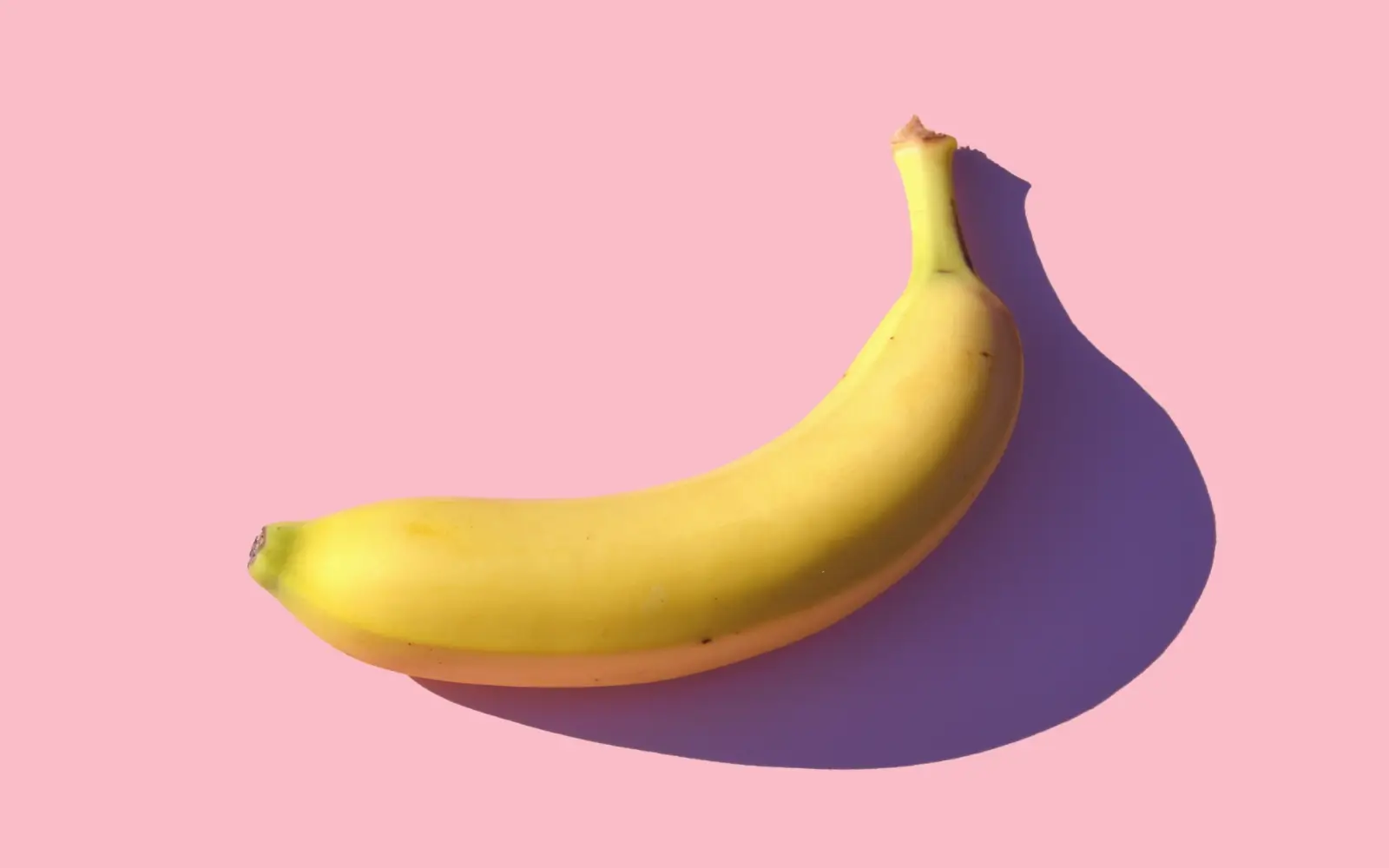
1. When You’re Drained: Grab a Banana
Natural sugars + vitamin B6 give you steady energy and help your body make serotonin.
When you’re running on fumes, your body craves quick energy. Bananas deliver this through natural sugars (glucose, fructose, and sucrose) that provide both immediate and sustained energy. The real magic happens with vitamin B6, which plays a crucial role in converting tryptophan into serotonin.
Why it’s important: Research shows that vitamin B6 deficiency is linked to mood disorders and fatigue. Just one medium banana provides about 20% of your daily B6 needs, helping your brain produce the neurotransmitters that regulate mood and energy levels.
Try this: Keep bananas on your counter for easy access, and pair with a tablespoon of almond butter for sustained energy.

2. When You’re Stressed: Reach for Dark Chocolate
A couple squares lower stress hormones and give your brain a gentle boost.
Dark chocolate isn’t just a guilty pleasure — it’s actually a scientifically-backed stress buster. The flavonoids in cocoa help reduce cortisol levels while providing a mild mood lift through compounds that stimulate endorphin production.
Why it’s important: A recent study found that people who ate dark chocolate (70% cocoa or higher) daily for two weeks showed significantly reduced stress hormone levels compared to those who didn’t. The key is moderation — a small amount goes a long way.
Try this: Keep a high-quality dark chocolate bar in your desk drawer for stressful moments. Not all chocolate is created equal — aim for 70% cocoa content or higher for maximum benefits.
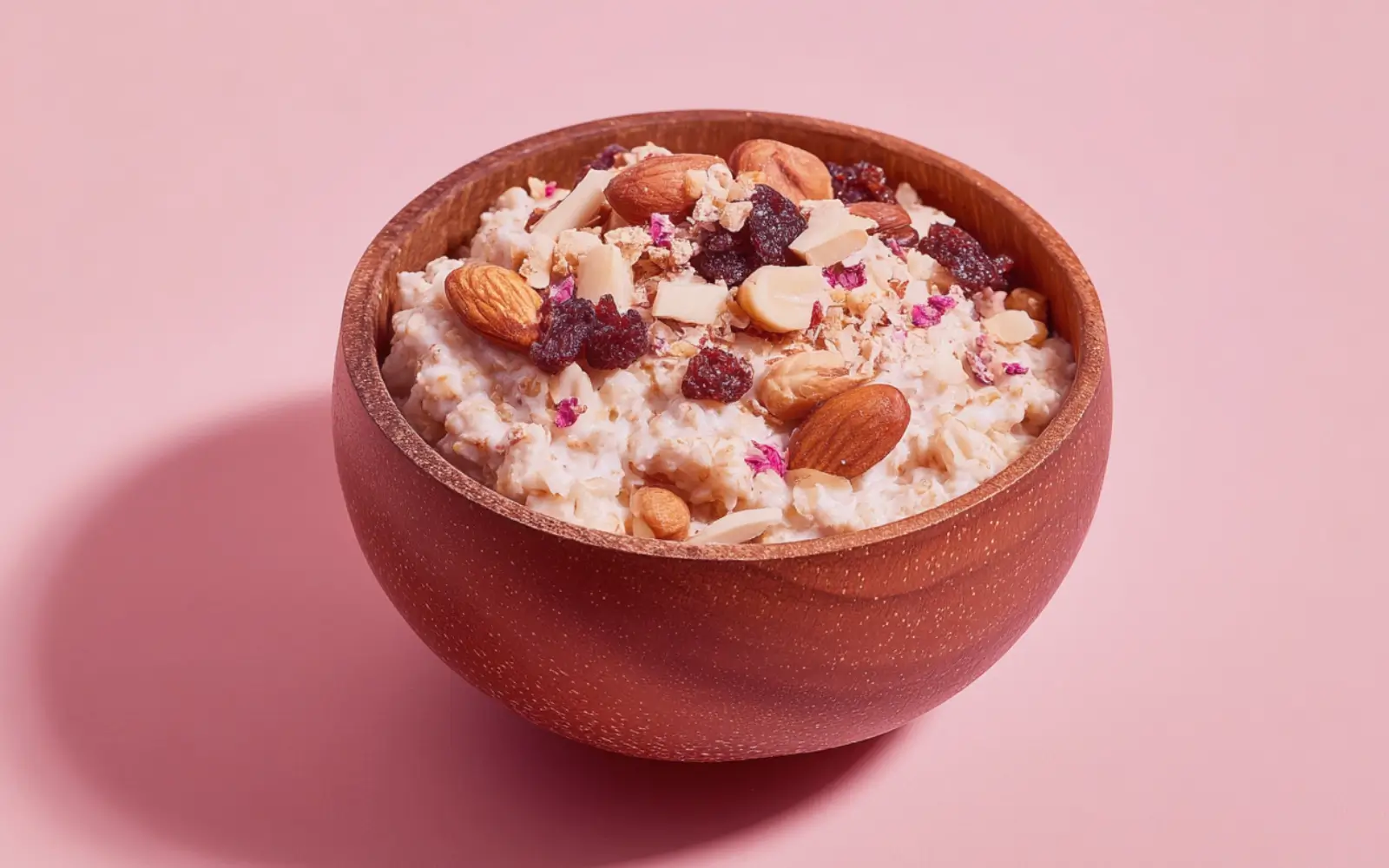
3. When You Need Comfort: Make Oatmeal
Warm carbs calm the nervous system and keep your blood sugar stable.
There’s something deeply comforting about a warm bowl of oats, and there’s science behind that feeling. Complex carbohydrates trigger the release of serotonin while providing steady glucose to your brain. The warmth and ritual of eating something cozy can also activate your parasympathetic nervous system.
Why it’s important: According to research from MIT, complex carbohydrates increase serotonin production more effectively than simple sugars, providing mood benefits without the crash. Oatmeal’s beta-glucan fiber also helps regulate blood sugar, preventing the mood swings that come with energy spikes and dips.
Try this: Top with berries and a drizzle of honey for natural sweetness and extra antioxidants.
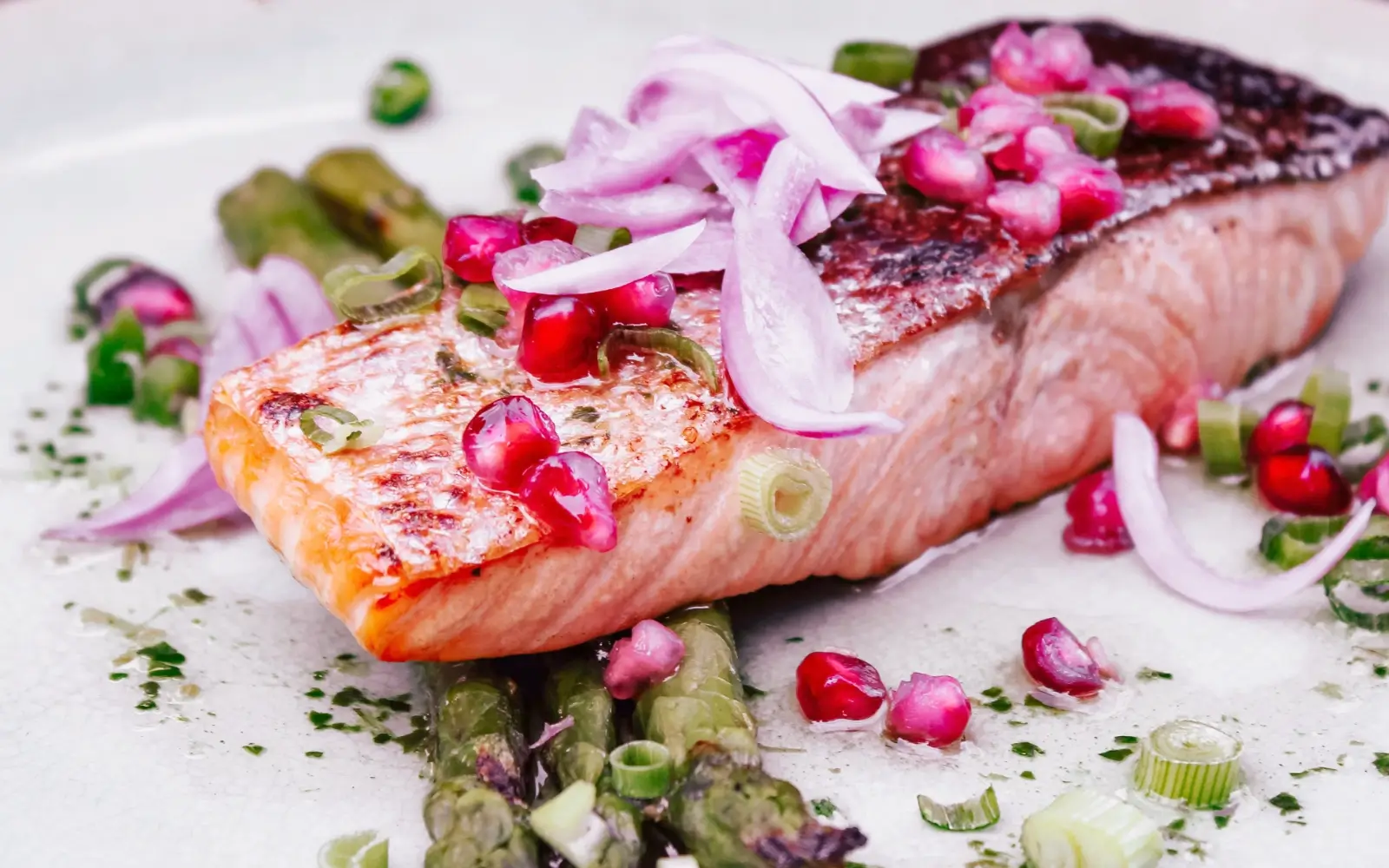
4. When You’re Anxious: Try Salmon (or Any Fatty Fish)
Omega-3s support brain health and help dial down anxious feelings.
Fatty fish like salmon, mackerel, and sardines are packed with omega-3 fatty acids — specifically EPA and DHA — which are essential for brain function and mood regulation. These healthy fats help reduce inflammation in the brain, which is linked to anxiety and depression.
Why it’s important: A meta-analysis published in JAMA Network found that omega-3 supplementation significantly reduced anxiety symptoms across multiple studies. Dr. Joseph Hibbeln from the National Institute of Health notes that populations with higher fish consumption have notably lower rates of depression and anxiety disorders.
Remember: Even canned salmon or sardines provide these benefits — fresh isn’t always necessary. If fish isn’t your thing, walnuts, chia seeds, and flaxseeds offer plant-based omega-3s.
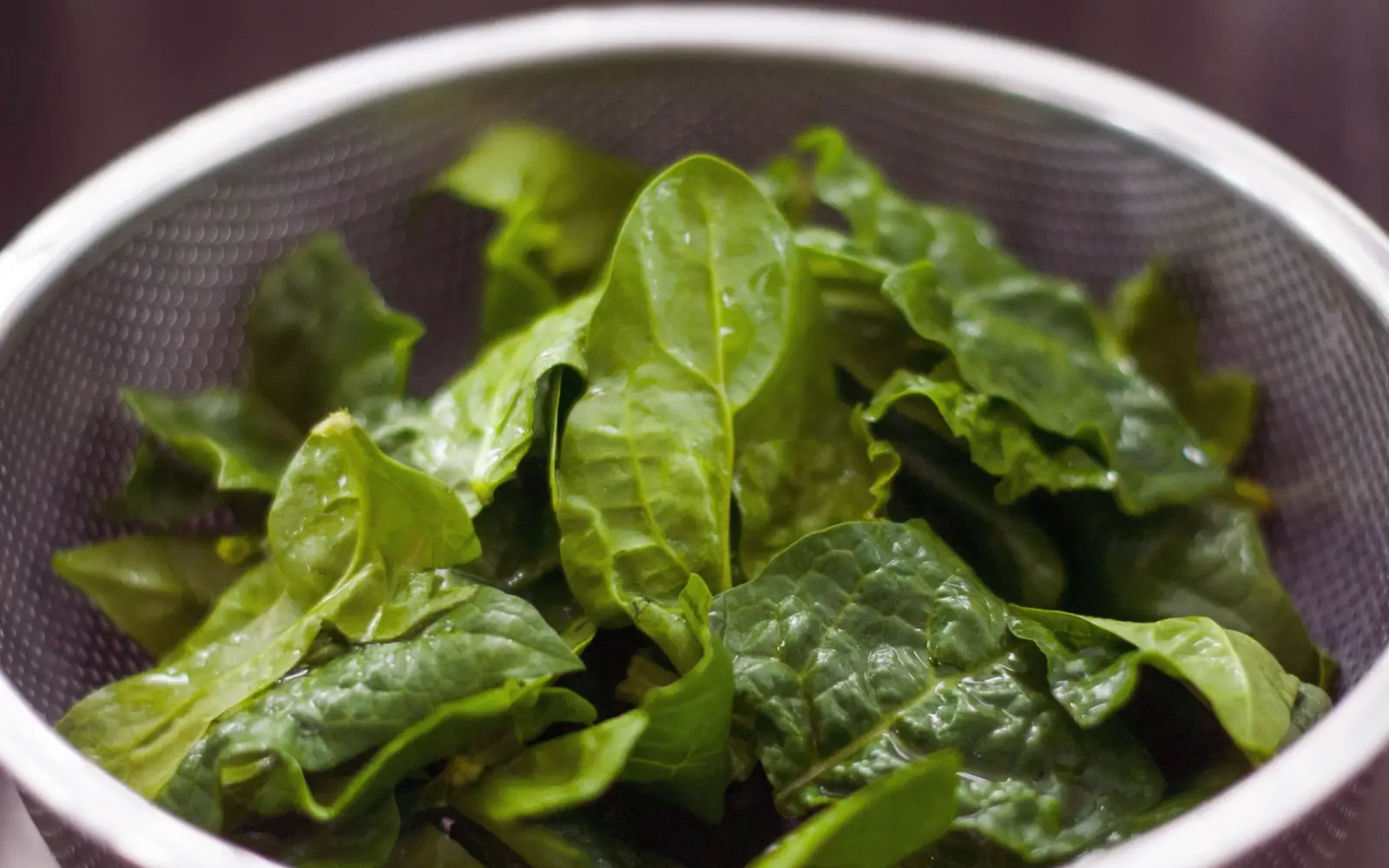
5. When You’re Tense: Add Leafy Greens
Magnesium-rich spinach and kale help muscles relax and ease stress.
When tension builds up in your shoulders and jaw, your body might be telling you it needs magnesium. Leafy greens like spinach, kale, and Swiss chard are among the best food sources of this essential mineral, which acts as a natural muscle relaxant and nervous system calmer.
Why it’s important: Research found that magnesium deficiency is linked to increased stress and anxiety. About 300 mg daily (roughly 2 cups of cooked spinach) can help reduce muscle tension and promote relaxation. Magnesium also supports healthy sleep patterns, which directly impacts mood.
Try this: Blend spinach into smoothies, add greens to wraps, mix them with grains, bake them into crisp chips, or sauté kale with garlic for a simple side.
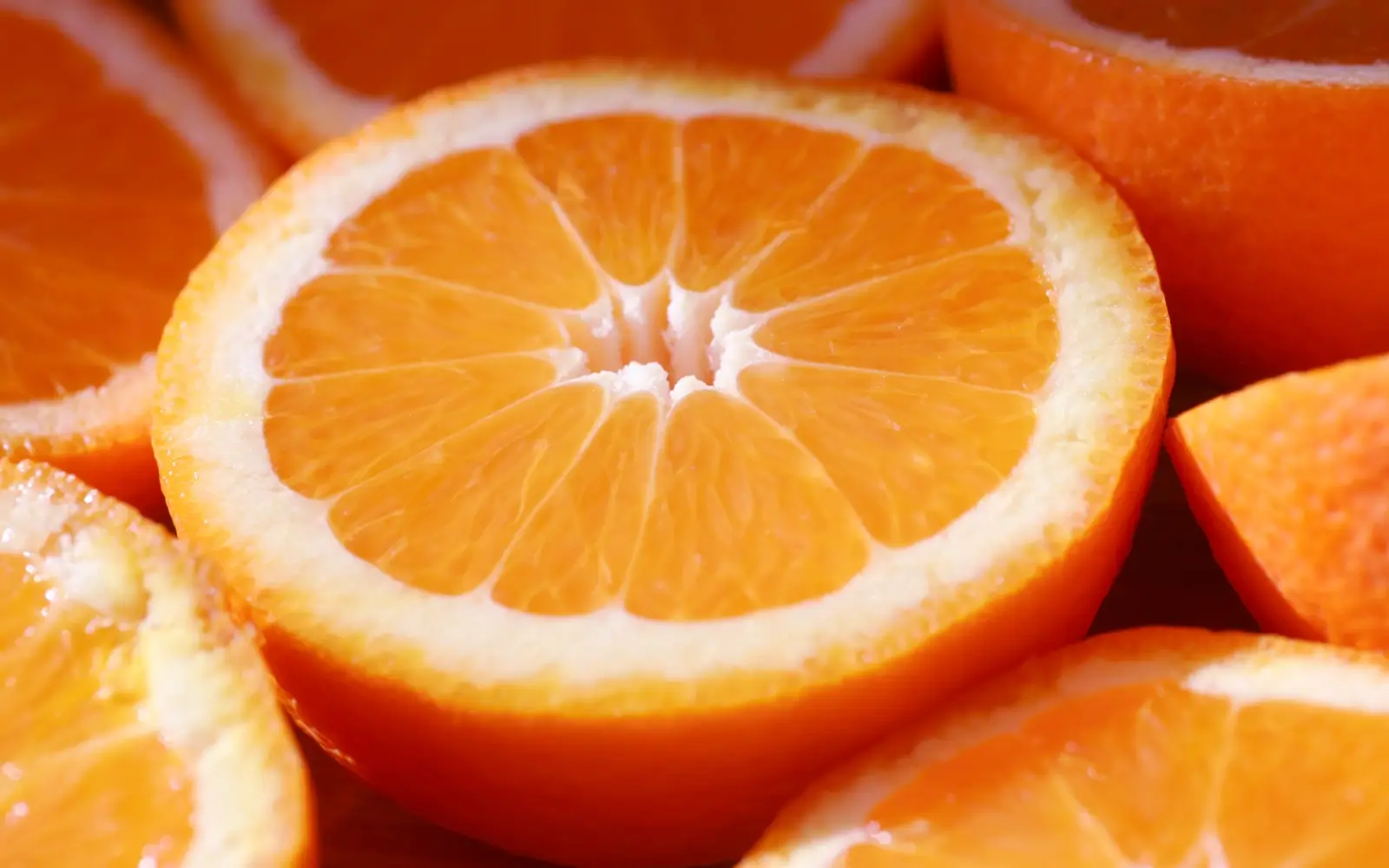
6. When You’re Sluggish: Peel a Citrus Fruit
Vitamin C lowers cortisol and brings a refreshing, energizing lift.
The bright, zesty scent of citrus alone can be energizing, but the vitamin C content provides real physiological benefits. This powerful antioxidant helps combat stress-induced cortisol while supporting adrenal function and energy production.
Why it’s important: Studies show that people who take vitamin C supplements have lower cortisol levels and reported feeling less stressed after challenging situations. One medium orange provides about 70 mg of vitamin C — nearly your entire daily requirement.
Quick tip: Plan ahead by packing easy-to-peel fruits like clementines or tangerines in your bag, giving yourself a simple way to stay fueled and focused on the go.
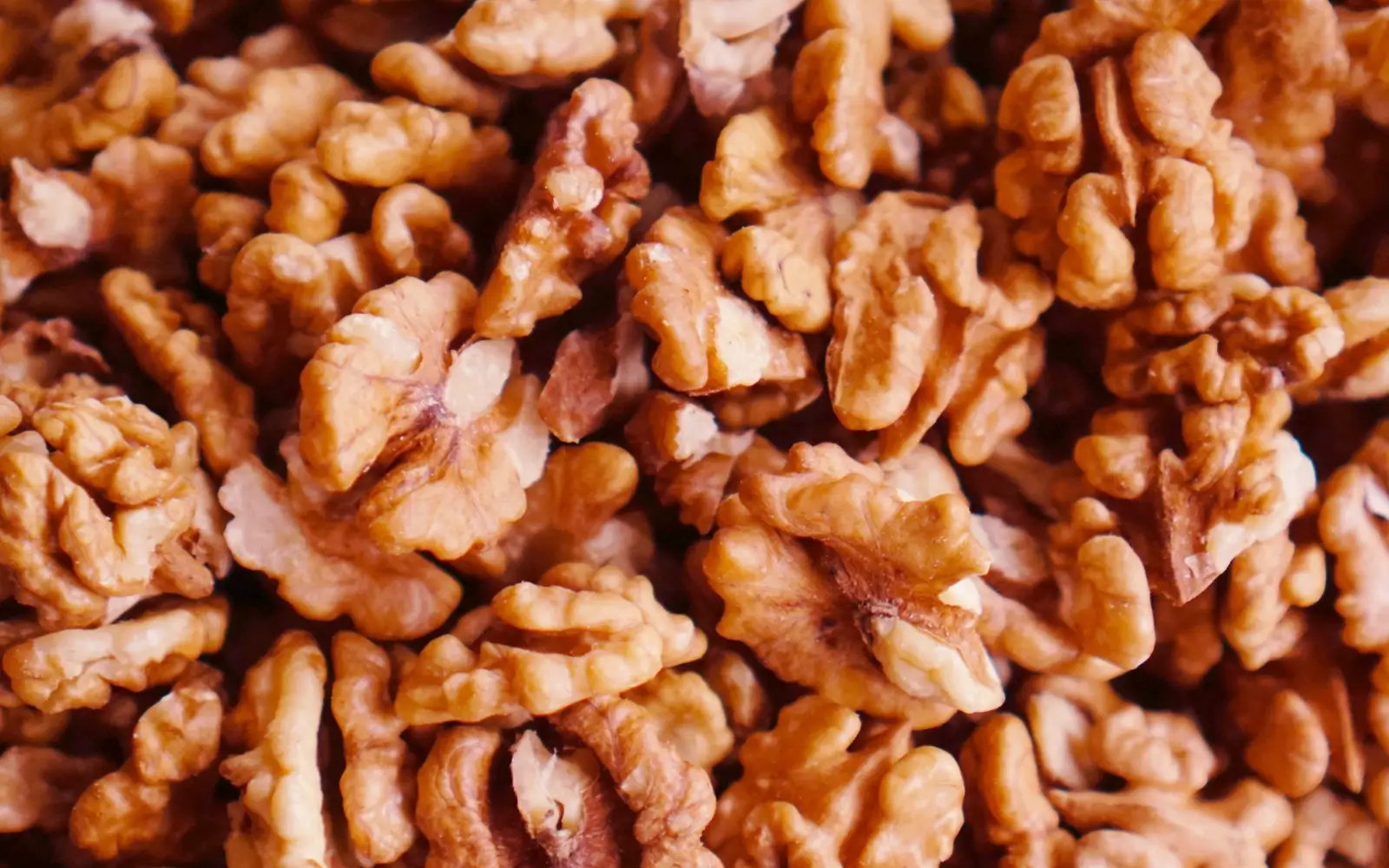
7. When You’re Hangry: Snack on Nuts & Seeds
Protein + healthy fats steady blood sugar and prevent mood crashes.
That combination of hunger and anger — “hanger” — happens when blood sugar drops too low. Nuts and seeds provide the perfect trifecta of protein, healthy fats, and fiber to stabilize blood glucose and keep mood swings at bay.
Why it’s important: Nutritionist Marion Nestle explains that the protein and fat in nuts slow digestion, providing steady energy release rather than the spike-and-crash cycle of sugary snacks. Just a small handful (about 1 ounce) provides lasting satiation and mood stability.
Try this: Pre-portion mixed nuts into small containers to avoid overeating during stressful times. Raw or lightly roasted options are best — heavily salted varieties can stress your system.

8. When You’re Foggy: Sip Green Tea
L-theanine plus gentle caffeine sharpen focus without jitters.
Brain fog often calls for caffeine, but coffee can sometimes make anxiety worse. Green tea offers a gentler alternative with its unique combination of caffeine and L-theanine — an amino acid that promotes calm alertness without the jitters.
Why it’s important: Research shows that L-theanine increases alpha brain waves, which are associated with relaxed concentration. Combined with caffeine, it provides sustained mental clarity without the crash that often comes with coffee.
Try this: Steep for 3-4 minutes and add a slice of lemon for extra vitamin C and flavor.
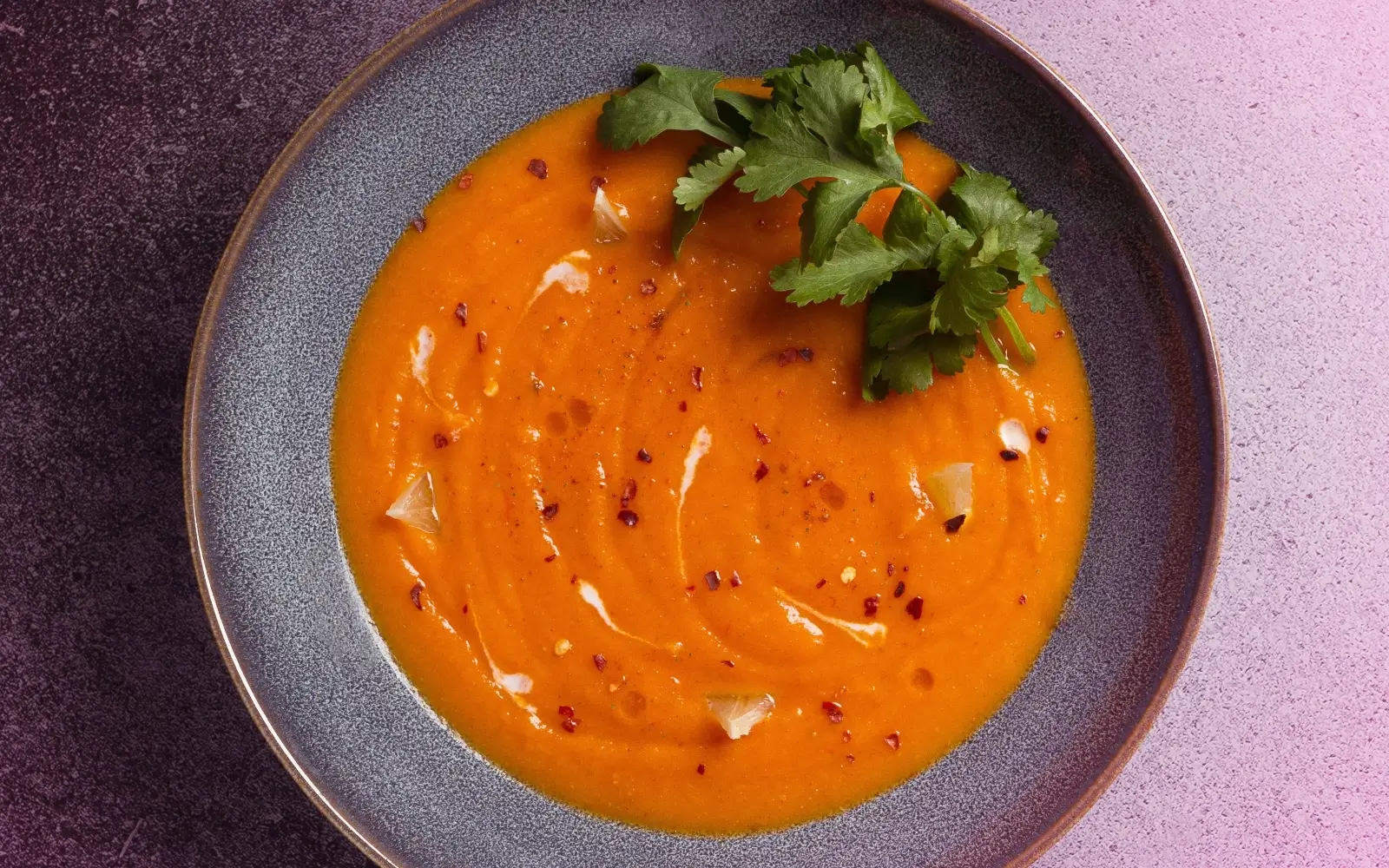
9. When You Need Cozy Vibes: Heat Up Soup
Warm broth is hydrating, soothing, and easy comfort in a bowl.
Sometimes you need food that feels like a warm hug, and soup delivers on multiple levels. The warmth is physiologically comforting, the liquid helps with hydration (dehydration can worsen mood), and the ritual of eating something warm and nurturing activates your body’s relaxation response.
Why it’s important: Research shows that warm foods increase feelings of interpersonal warmth and comfort. Whether it’s chicken soup, vegetable broth, or miso soup, the combination of warmth, salt, and liquid helps restore both physical and emotional balance.
Healthy Tip: Prepare a big batch of hearty soup on the weekend and freeze individual portions — you’ll always have a quick, nourishing meal ready when time is short.
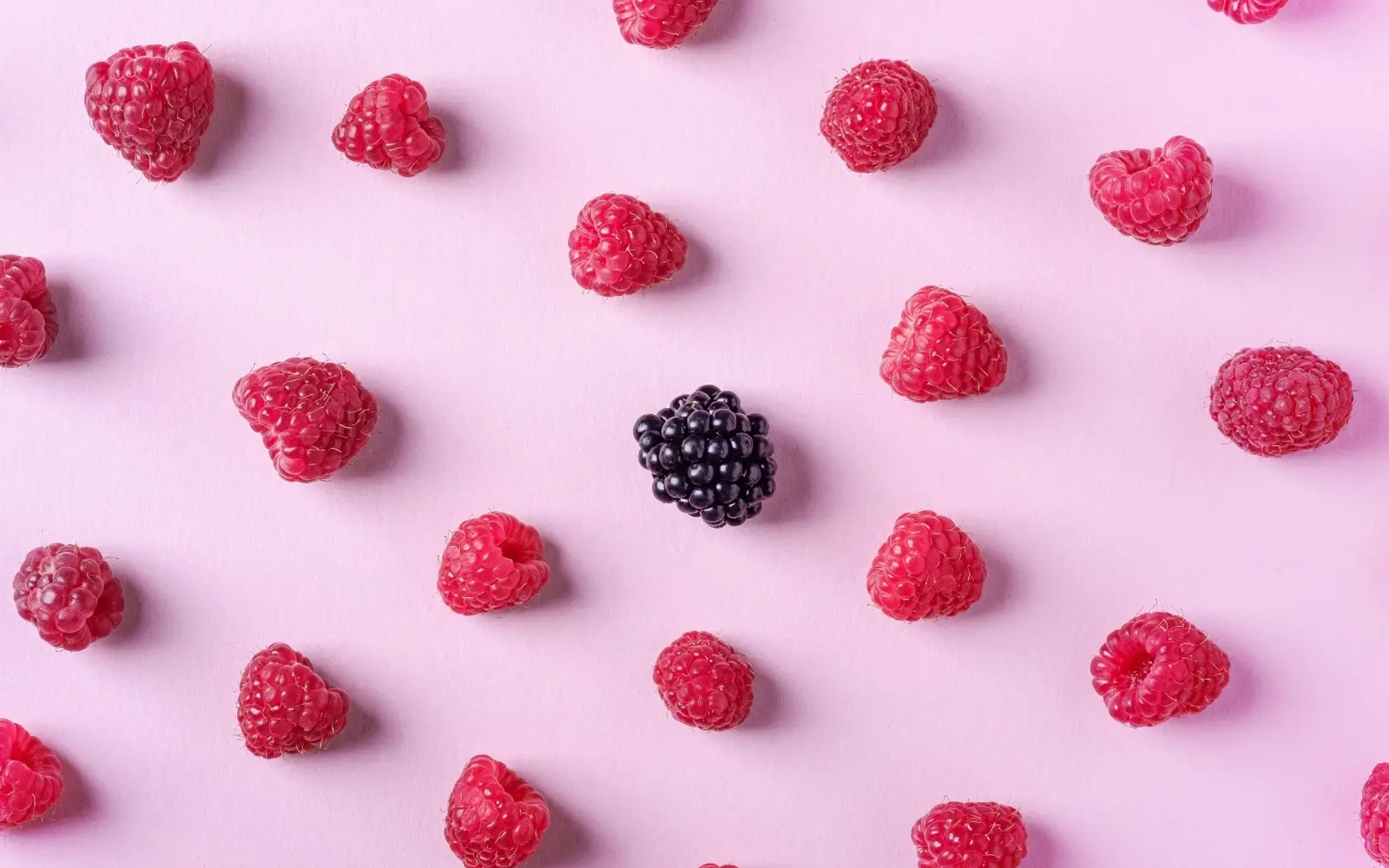
10. When You’re Blah: Grab a Handful of Berries
Antioxidants fight brain fog and bring a bright, fresh flavor lift.
When everything feels dull and flat, berries offer a burst of natural sweetness plus powerful antioxidants that support brain function. Blueberries, in particular, contain anthocyanins that cross the blood-brain barrier and may improve communication between brain cells.
Why it’s important: A study published in the Frontiers of Nutrition found that people who consumed berries regularly showed improved mood and cognitive function. The natural sugars provide a gentle energy lift, while antioxidants help combat oxidative stress that can contribute to mental fatigue.
Try this: Keep frozen berries on hand — they’re just as nutritious as fresh and won’t spoil. Sometimes the simple act of eating something colorful and fresh can shift your perspective, even if it’s just a little.

11. When You’re Overwhelmed: Have Some Greek Yogurt
Probiotics support gut health while protein helps stabilize blood sugar and mood.
When life feels like it’s spinning out of control, your gut might be feeling it too. Greek yogurt delivers a double benefit: probiotics that support the gut-brain connection and high-quality protein that keeps your blood sugar — and emotions — more stable.
Why it’s important: Dr. Emeran Mayer, author of “The Mind-Gut Connection,” explains that the gut microbiome directly influences mood through the vagus nerve. Research published in Psychiatry Research found that people who consumed probiotic-rich foods like yogurt showed reduced activity in brain regions associated with stress and anxiety.
Try this: Choose plain Greek yogurt and add your own toppings like berries or honey to control sugar content.

12. When You’re Restless: Reach for Chamomile Tea
Natural compounds promote relaxation and help quiet an overactive mind.
When you can’t sit still and your thoughts are racing, chamomile tea offers gentle, natural sedation without making you drowsy. The herb contains apigenin, a compound that binds to specific receptors in your brain to promote calmness and reduce anxiety.
Why it’s important: A recent published study found that people with generalized anxiety disorder who took chamomile extract showed significant reductions in anxiety symptoms compared to those who took a placebo. The ritual of brewing and sipping warm tea also activates the parasympathetic nervous system.
Remember: Chamomile is generally safe, but check with your doctor if you take blood thinners. Brewing and mindfully sipping it can promote relaxation, reduce stress, and support restful sleep.
The Bottom Line
Food won’t solve every bad mood, but it can be a gentle, accessible way to support your body and brain when you’re struggling. The beauty of these options is that they’re simple, widely available, and require no special preparation when you’re not feeling your best.
Research consistently shows that what we eat directly impacts how we feel, think, and cope with stress. By keeping some of these mood-supporting foods on hand, you’re creating a toolkit for those inevitable rough days.
What matters most isn’t perfection — it’s having options that feel both nourishing and comforting when you need them. Which of these foods sounds most appealing to you right now?
Medical and Health Disclaimer: This article is for informational and educational purposes only and is not intended as medical advice. The suggestions provided are general wellness recommendations and should not replace professional medical consultation, diagnosis, or treatment. If you’re experiencing persistent mood changes, depression, anxiety, or other mental health concerns, please consult with a qualified healthcare provider or mental health professional. Some individuals may have food allergies, dietary restrictions, or medical conditions that make certain foods unsuitable. Always check with your doctor before making significant dietary changes, especially if you have existing health conditions or take medications. The research and expert opinions cited are for educational purposes and do not constitute personal medical recommendations. Individual responses to foods can vary, and what works for some people may not work for others. If you’re experiencing a mental health crisis, please contact your local emergency services or a mental health crisis hotline immediately.
Related articles
The Science of Wellbeing: How Positive Psychology Can Transform Your Life
Discover evidence-based strategies to boost happiness and build lasting resilience.
The Connection Between Nutrition and Mental Health
Explore how specific foods and nutrients directly impact brain function and mood regulation.
Building a Wellbeing Routine: Habits for Mental and Physical Health
Create sustainable daily practices that support both your mind and body for long-term wellness.
Mindfulness for Beginners: Simple Techniques for Everyday Life
Learn accessible mindfulness practices that fit seamlessly into your busy schedule.
The Mind-Body Connection: Holistic Approaches to Personal Development
Understand how physical and mental health work together for complete wellbeing.
Further reading
“Inward” by Yung Pueblo
A modern guide to mindfulness and emotional wellbeing that complements the article’s focus on mental health through self-awareness.
“The Gifts of Imperfection” by Brené Brown
Explores self-compassion and vulnerability as foundations for emotional resilience, supporting the article’s holistic approach to mood management.
“The Body Keeps the Score” by Bessel van der Kolk
A deep dive into how trauma affects the body and innovative treatments for recovery.
“The Happiness Advantage” by Shawn Achor
Discusses how positive psychology can improve performance and reduce stress, complementing the article’s focus on mood management.





